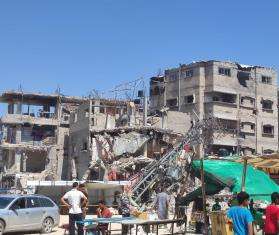Medical Team Appeals to the Warring Parties to Respect Neutrality of Medical Facilities
Paris/New York, February 4, 1999 — Yesterday, February 3rd, a team of five expatriates from the international medical relief agency Doctors Without Borders/Médecins Sans Frontières (MSF) were able to restart their surgical program at Connaught hospital, the main hospital in Freetown, Sierra Leone.
Twelve surgical operations have already been undertaken with the Sierra Leonese surgical team at Connaught Hospital. However 200 patients still require urgent surgical care; most of them suffer from war injuries such as gunshots and mutilations. Some of these patients have open wounds that have been infected for several days. The hospital is suffering from a serious shortage of local medical staff.
One MSF surgeon is also working at Netlands hospital, where 30 wounded people await urgent surgery. Furthermore, MSF national staff continue to provide basic health services for an estimated 12,000 people seeking refuge in the sports stadium in Freetown.
The MSF team is composed of two surgeons (one French, one Czech), one Dutch anesthesiologist, one French doctor, and an Italian Head of Mission. The team is based in Cap Sierra but moves from there to the two hospitals daily.
MSF appeals to the warring parties to respect the neutrality of medical facilities and personnel, both local and international.
MSF has worked in Connaught hospital since the coup d'etat in May 1997. Between February and March 1998, 960 surgical interventions were performed in collaboration with the Sierra Leonese medical personnel. Since then, MSF has been supplying the hospital with medical equipment and drugs in order to ensure free treatment for war casualties and the poorest patients. A training program has also been provided for the surgical theater nurses and nurse-anesthesiologists. This program was suspended and the team evacuated on December 26th due to extreme insecurity. Another MSF team is still working in Kambia, where they provide medical and nutritional services for the population of approximately 15,000 which includes 10,000 displaced.



